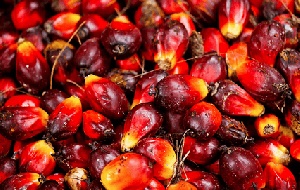Business News of Thursday, 8 May 2025
Source: www.ghanawebbers.com
Report calls for fairer palm oil value chains in West Africa
A new report, "Palm Oil Barometer 2025: Procurement for Prosperity," calls for changes in global palm oil procurement.
The report highlights the need for fair value distribution to help smallholder farmers in West Africa. It states that oil palm is crucial for food security and income. This crop can lift farming families out of poverty within a generation.
The 2025 Palm Oil Barometer was developed by Solidaridad. It was co-signed by various smallholder representatives and experts. The report identifies imbalances in the market, where smallholders receive a small share of profits despite their contributions.
In Ghana, smallholders manage about 81% of the oil palm area. However, many face low yields and limited market access. In Nigeria, smallholders contribute to 80% of production but struggle with outdated processing methods and poor infrastructure.
Côte d’Ivoire's smallholders manage 73% of oil palm areas. In Sierra Leone, small-scale farmers account for around 70% of production, often relying on wild groves. West Africa consumes more palm oil than it produces and relies on imports.
The report states that systemic barriers limit smallholder farmers' incomes and national food security. Mr. Muthalir Ramasamy Chandran emphasized the need for collaboration among governments, industry, and sustainability platforms. He called for a new business model to support independent smallholder farmers.
The core finding of the barometer is that value distribution is inequitable throughout the supply chain. Smallholders struggle to invest in sustainable practices due to precarious incomes affected by volatile prices and climate change.
Mr. Michael Opong, an oil palm farmer from Eastern region, noted serious challenges in production. Many farmers lack proper tools and infrastructure, leading to low yields and poor processing capacity. Even with training, low incomes hinder investments in improvements.
He stated that consistent support is needed to overcome these barriers. With adequate help, farmers can strengthen their contributions to the global market.
Mr. Opong warned that underinvestment threatens the entire sector's future. Without better financing and technical assistance, farmers resort to short-term survival strategies that harm the environment.
Land tenure insecurity also limits investment in long-term sustainability efforts among smallholders.
The Palm Oil Barometer advocates transitioning to a "Procurement for Prosperity" approach. This means moving beyond mere sustainability certifications toward fair trading practices that benefit independent smallholders.
The report outlines four principles for this approach: companies should integrate procurement practices recognizing independent smallholders; fair pricing must reward sustainable practices; partnerships should include farmers’ perspectives; and downstream companies should invest in suppliers' capabilities.
Madam Marieke Leegwater from Solidaridad Europe stated that simply demanding sustainable production is not enough. Companies must commit to an inclusive value chain recognizing independent farmer voices while ensuring fair prices enable living incomes.
As new regulations like EUDR come into effect, she stressed a balanced approach addressing deforestation while ensuring human rights and inclusion of smallholders.
The Palm Oil Barometer 2025 offers recommendations for value chain actors, policymakers, and financial sectors aiming at advancing inclusivity among smallholders in the palm oil industry.
Every actor has a role in ensuring fair value distribution supporting independent smallholders critical to the sector’s future.











